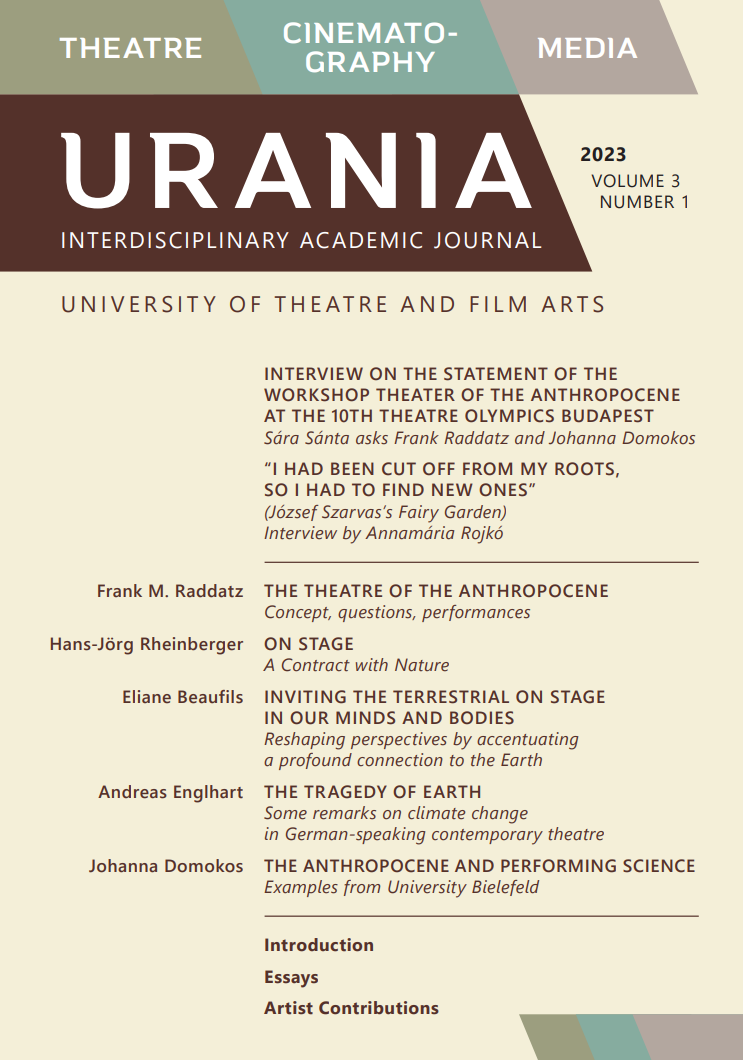The Tragedy of Earth
Some Remarks on Climate Change In German-Speaking Contemporary Theatre
Abstract
This study explores the intersection of climate change and contemporary German-speaking theatre. The paper delves into the challenges posed by climate change and species extinction, emphasizing the need for presenting facts and fostering commitment. Drawing parallels to ancient Greek tragedies, the author examines the dramaturgical potential of political theatre to address the "tragedy of the earth" and instigate essential changes. The study covers various aspects, including the presentation of scientific facts and scenarios, the role of reason and ethics in theatre, the portrayal of Gaia (Earth) on stage, and the call for action in the tradition of Brecht and contemporary theatre. The exploration extends to the use of masks, the evolving nature of postdramatic and post-human theatre, and the challenge of representing nature and Gaia within traditional dramatic forms. The author concludes by discussing the ongoing search for an adequate theatrical form to address the tragedy of climate change and species extinction, emphasizing the role of drama and theatre in helping humanity navigate these challenges.
References
Aristoteles. 1980. Poetik. Stuttgart: Reclam.
Bardutzky, Raphaela. 2022. Das Licht der Welt. Köln: Kiepenheuer.
Braidotti, Rosi. 2013. The posthuman. Cambridge: Polity Press.
Brecht Bertolt.1994. „Katzgraben-Notate“. In Brecht. Werke, Vol. 25, Edited by Werner Hecht, 399–490. Berlin: Suhrkamp.
Frisch, Max. 1982. Der Mensch erscheint im Holozän. Eine Erzählung. Frankfurt am Main: Suhrkamp.
Gabriel, Markus et al. 2022. Auf dem Weg zu einer Neuen Aufklärung. Ein Plädoyer für zukunftsorientierte Geisteswissenschaften (The New Institute. Interventions). Bielefeld: transcript Verlag. https://doi.org/10.14361/9783839466353
Gabriel, Markus. 2022. Der Mensch als Tier. Berlin: Ullstein.
Heckmanns, Martin. 2021. Etwas Besseres als den Tod finden wir überall. Berlin: Suhrkamp.
Köck, Thomas.2017. paradies fluten/paradies hungern/paradies spielen. Berlin: Suhrkamp.
Latour, Bruno. 1993. We Have Never Been Modern. Hemel Hempstead: Harvester Wheatsheaf.
Latour, Bruno. 2017. Kampf um Gaia. Berlin: Suhrkamp.
Lehmann, Hans-Thies. 2002. Das politische Schreiben. Berlin: Theater der Zeit.
Lehmann, Hans-Thies. 2013. Tragödie und dramatisches Theater. Berlin: Alexander Verlag. 13 Down to Earth. https://www.berlinerfestspiele.de/de/immersion/programm/2020/down-toearth/ Viewed on 08 July 2023.
Lovelock, James. 1988. The Ages of Gaia. New York: Norton.
Lovelock, James. 2009. The Vanishing Face of Gaia. A Final Warning. New York: Basic Books.
Margulis, Lynn. 1999. Slanted Truths. Essays On Gaia, Symbiosis And Evolution. New York: Springer.
Martin, Heckmanns. 2021. Etwas Besseres als den Tod finden wir überall. Berlin: Suhrkamp.
Marx, Karl. 1998. „Exzerpte und Notizen Sommer 1844 bis Anfang 1847; Notizbuch aus den Jahren 1844–1847, 1) ad Feuerbach“. In Karl Marx/Friedrich Engels Gesamtausgabe (Mega), Vierte Abteilung, Bd. 3., 19-21. Berlin: Akademie Verlag.
Matter, Selma. 2022. Grelle Tage. Berlin: Suhrkamp.
Popper, Karl. 2007. Logik der Forschung. Berlin: Akademie Verlag.
Raddatz, Frank M. 2021. Das Drama des Anthropozäns. Berlin: Theater der Zeit.
Röggla, Kathrin. 2022. Das Wasser. Frankfurt am Main: Fischer.
Schechner, Richard. 1966. “Approaches to Theory/Criticism”. The Tulane Drama Review 10/4: 20–53. https://doi.org/10.2307/1125208
Schechner, Richard. 1974. „From Ritual to Theatre and Back. The Structure/Process of the Efficacy-Entertainment Dyad.” Educational Theatre Journal 26/4: 455–481. https://doi.org/10.2307/3206608
Weizsäcker, Ernst Ulrich von, Wijkman Anders et al. 2017. Wir sind dran – Club of Rome. Der große Bericht: Was wir ändern müssen, wenn wir bleiben wollen. Eine neue Aufklärung für eine volle Welt. Gütersloh: Gütersloher Verlagshaus.
Wirth, Andrzej és Ulvaeus Marta. 1999. „The Lehrstück As Performance”. TDR 43/4: 113–121. https://doi.org/10.1162/105420499760263570




